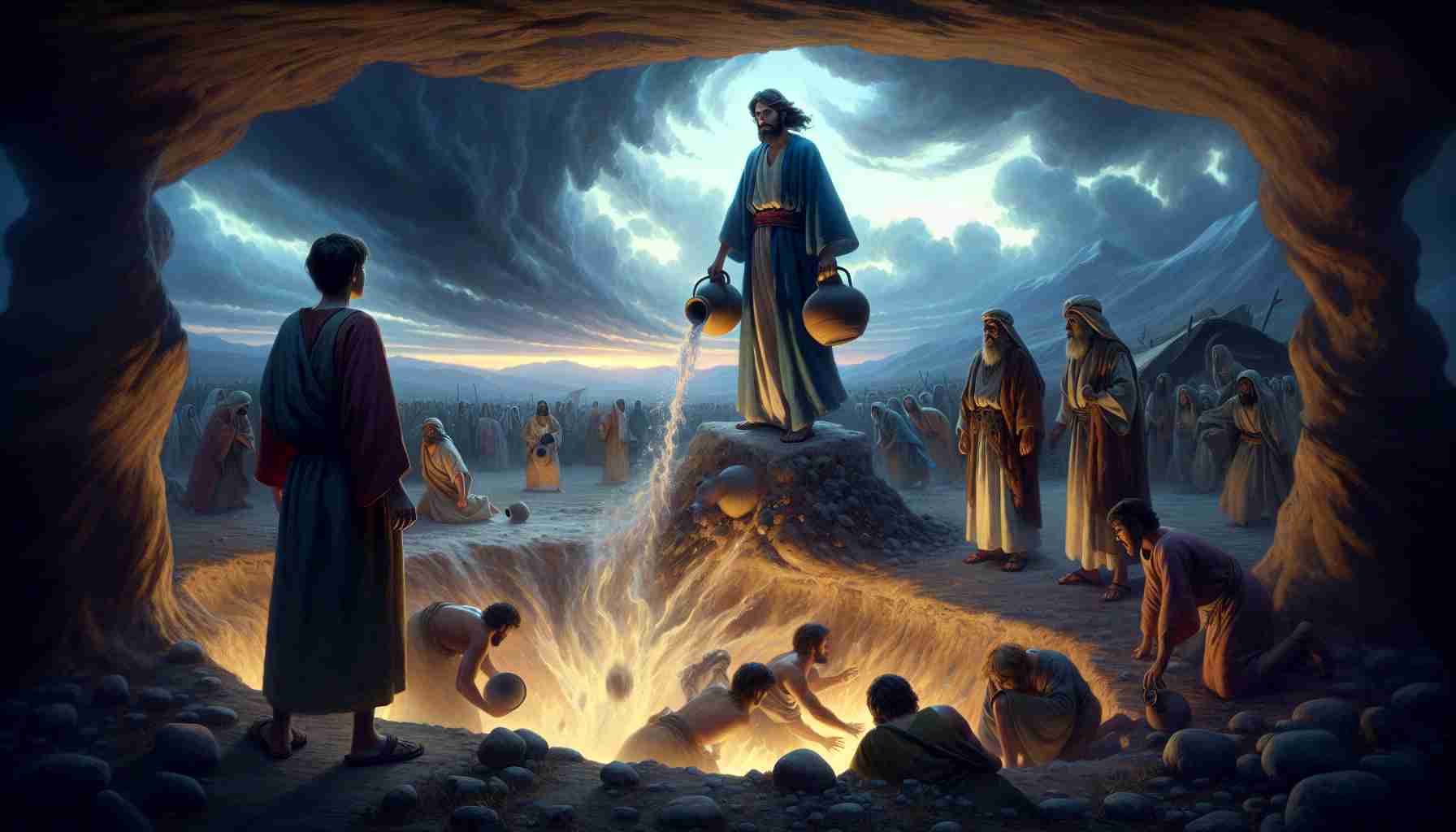

We were gathering wood for the evening fire when I heard the shouting again. “Moshe takes too much for himself!” Korach bellowed, loud enough to shake my very bones. I turned to my father, but he kept gathering dried branches, silent, as if he hadn’t heard. But we’d all heard Korach.
You won’t find my name in any scroll. I was just a boy—twelve years old—when the earth opened its mouth. But I saw it. I saw everything.
Korach was from the tribe of Levi, just like Moshe—Moses, the one chosen by the Lord to lead us. Korach was smart. His words were clever. “Aren’t we all holy?” he had said. “Why should Moshe and Aharon be so special?” Aharon—Moses’ brother—had been chosen by God to be the Kohen Gadol, the High Priest. Korach didn’t like that.
Some of us wondered if Korach maybe had a point. He spoke with so much confidence. He made people feel important—especially the ones already upset about wandering through the desert. My uncle said Korach just wanted power. I didn’t understand why that would be so bad—until the ground moved.
The day Moshe answered Korach’s challenge, the sun was numb behind gray clouds. Moshe stood tall, but I saw the sadness in his face. “If these men die a natural death,” he said, “then the Lord has not sent me. But if the earth opens its mouth and swallows them alive, then you will know they have rebelled against God.”
People gasped, and I stepped back. My feet shook. We all stared at the ground. For a heartbeat, nothing happened.
And then—cracks. Loud, terrible, like bones breaking across the land. I heard screams. The earth split open beneath Korach and the men who stood with him. They fell into the pit—into the darkness—and the ground shut itself like a mouth finished eating. Gone.
Silent.
I couldn’t breathe. No one could. For the first time in days, maybe weeks, there wasn’t a single voice raised against Moshe. Even the wind hushed.
Someone next to me whispered, “It’s true. Moshe didn’t choose himself. God chose him.”
That night, I asked my father, “Why did they have to die like that?”
He pressed a hand to my shoulder. “Because pride makes a man believe he stands taller than truth. Korach didn’t just question Moshe—he questioned God’s order, God’s holiness. And when we rebel against the Lord’s will, we dig a hole beneath our own feet.”
I still think about that day. About how dangerous it is to let pride grow bigger than humility. About how Moshe, though powerful, still humbled himself before God. And how Korach, though loud, sank into silence.
When I feel anger, I remember the sound of the earth cracking. When I feel like shouting for my own way, I think of the silence that followed. And I ask myself—am I lifting myself up? Or listening for the voice of the Lord?
We were gathering wood for the evening fire when I heard the shouting again. “Moshe takes too much for himself!” Korach bellowed, loud enough to shake my very bones. I turned to my father, but he kept gathering dried branches, silent, as if he hadn’t heard. But we’d all heard Korach.
You won’t find my name in any scroll. I was just a boy—twelve years old—when the earth opened its mouth. But I saw it. I saw everything.
Korach was from the tribe of Levi, just like Moshe—Moses, the one chosen by the Lord to lead us. Korach was smart. His words were clever. “Aren’t we all holy?” he had said. “Why should Moshe and Aharon be so special?” Aharon—Moses’ brother—had been chosen by God to be the Kohen Gadol, the High Priest. Korach didn’t like that.
Some of us wondered if Korach maybe had a point. He spoke with so much confidence. He made people feel important—especially the ones already upset about wandering through the desert. My uncle said Korach just wanted power. I didn’t understand why that would be so bad—until the ground moved.
The day Moshe answered Korach’s challenge, the sun was numb behind gray clouds. Moshe stood tall, but I saw the sadness in his face. “If these men die a natural death,” he said, “then the Lord has not sent me. But if the earth opens its mouth and swallows them alive, then you will know they have rebelled against God.”
People gasped, and I stepped back. My feet shook. We all stared at the ground. For a heartbeat, nothing happened.
And then—cracks. Loud, terrible, like bones breaking across the land. I heard screams. The earth split open beneath Korach and the men who stood with him. They fell into the pit—into the darkness—and the ground shut itself like a mouth finished eating. Gone.
Silent.
I couldn’t breathe. No one could. For the first time in days, maybe weeks, there wasn’t a single voice raised against Moshe. Even the wind hushed.
Someone next to me whispered, “It’s true. Moshe didn’t choose himself. God chose him.”
That night, I asked my father, “Why did they have to die like that?”
He pressed a hand to my shoulder. “Because pride makes a man believe he stands taller than truth. Korach didn’t just question Moshe—he questioned God’s order, God’s holiness. And when we rebel against the Lord’s will, we dig a hole beneath our own feet.”
I still think about that day. About how dangerous it is to let pride grow bigger than humility. About how Moshe, though powerful, still humbled himself before God. And how Korach, though loud, sank into silence.
When I feel anger, I remember the sound of the earth cracking. When I feel like shouting for my own way, I think of the silence that followed. And I ask myself—am I lifting myself up? Or listening for the voice of the Lord?